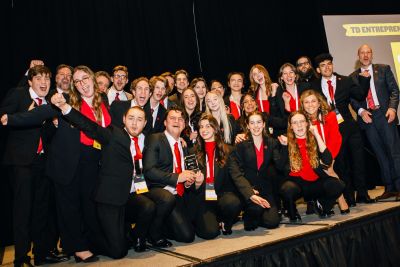21,000 steps for Rumi: a father’s love for his son, and a run for a cure
Okanagan College professor and community raising awareness and support for children battling a rare genetic disorder
“He’s just a little boy with a big, beautiful soul. Curly. Joyful. The easiest kid you could possibly imagine. He loves the colour blue, and his hotdogs. Light as a feather. Braver than me.”
These are the words Gill Green uses to describe his two-year old son, Rumi, who was recently diagnosed with Spinal Muscular Atrophy (SMA).
Green is a professor of Geography at Okanagan College in Kelowna. On Friday, Sept. 13, after months of mysterious symptoms and scores of tests, Rumi was diagnosed with the rare genetic disorder at B.C. Children’s Hospital.
“The diagnosis brought a combination of shock and grief,” says Green. “It began with us not knowing what the disease was, to hours and hours of research late at night, to wondering if he would live and for how long, and ultimately what his quality of life would be like.”
The symptoms and progression of SMA can be devastating.
“We learned quickly that SMA leads to progressive loss of ability to move and breathe and often to the end of life. It is the number one genetic cause of death for infants and yet it is rare. There are less than 30 people diagnosed with it in British Columbia, in a population of five million.”
Rumi, who was named for the 13th-century Persian poet, seemed perfectly healthy at birth. It wasn’t until about six months ago, when he reached 18 months old, that Green and his wife Claire first became aware something was amiss.
“We had friends over for dinner,” explains Green. “One was a fellow OC Geography professor and the other a child development specialist. She noticed Rumi wasn’t walking quite right. Not long after, we saw a pediatrician, followed by a number of specialists and eventually a neurologist and the entire neuromuscular team at BC Children’s Hospital. Eventually, via genetic testing, we found out it was Spinal Muscular Atrophy.”
SMA is a motor neuron disease. The motor neurons affect the voluntary muscles that are used for activities such as crawling, walking, head and neck control, swallowing, and breathing.
There are four types, which range in symptoms and severity. Rumi was diagnosed with Type II.
“Many who receive this diagnosis may never walk,” says Green. “They may not live past their early 20s. They may lose the ability to breathe in early adulthood.”
May being the key word, he notes. Hope exists for Rumi and other SMA sufferers in the form of new gene therapy drugs.
Thanks to quick work by the family’s neurologist Dr. Kathryn Selby, the Greens have already attained special coverage from the province and Biogen for Rumi to receive for a year a drug called Spinraza (nusinersen), one of the first gene therapies approved for SMA. Without the coverage, the drug costs about $120,000 per injection.
“Spinraza is delivered through a lumbar puncture (spinal tap),” explains Green. “When SMA children start Spinraza treatment, they have to do four loading doses – one spinal tap every two weeks. By January, Rumi’s frequency of dosing will go to once every four months.”
Recently, Green launched a Facebook page to track his son’s treatment journey and to help raise funds for SMA research. The page, like the boy who inspired it, is a story of lightness, joy and bravery.
A video posted on Nov. 18, just a few days after Rumi received his second spinal tap, shows a happy little boy singing to the birds while his father pushes him in his stroller down a quiet street.
Now, Green is taking more steps to help Rumi and others in the fight against SMA. 21,000 steps, to be precise.
He signed up to run the New York City Half Marathon next March and set a fundraising goal of $2,100 USD, or roughly a dime per step. To his surprise, support from family and friends, and his colleagues at Okanagan College, helped him surpass that goal within a few days of posting it here. He’s now raised more than $4,400.
“We were blown away by the outpouring of generosity,” says Green. “People at the College and so many others in our lives have been incredibly supportive. It’s given us a lot of hope and positivity.”
One of the people lending support in a powerful way is Green’s friend, OC colleague and former officemate Dr. Shelly Ikebuchi, a professor in the Sociology department.
Ikebuchi does pottery in her spare time and recently took to making ring dishes emblazoned with quotes by a particular poet – Rumi.
“It was one of those weird coincidences,” says Ikebuchi. “I’ve used quotes by Rumi for a while. When I learned what Gill’s Rumi was facing, I knew I wanted to make a gift. After I donated, I thought, ‘What can I do to raise more awareness, if not a little more money?’”
Ikebuchi continues to sell her Rumi-inspired ring dishes for $5 each, donating all proceeds to Green’s run fundraiser.
“I hope the community will support what Gill is doing to raise awareness and funds to find a cure for SMA, and help other families who are going through what they are going through.”
After meeting his original fundraising total, Green is now hoping others will be inspired to give.
“Anyone wanting to support what I’m doing, to support families in our situation, can donate directly to CureSMA Canada so that BC families directly benefit,” says Green.
And while he hopes Rumi’s story will inspire others to support SMA research, Green is also hoping his run and the Facebook page will spark greater awareness.
“My goal is to make sure that people know that this genetic disease exists,” he says. “And from then on, hopefully we can build momentum so that access to medicine and prenatal and newborn screening in B.C. will match other regions across Canada and North America. Anyone looking for more information about what our journey has been like, and the struggles facing SMA families in B.C., can check out the Facebook page and follow along.
“I want to thank everyone who has given or sent us their messages of hope, especially the College as an institution and community – it means the world to us.”



